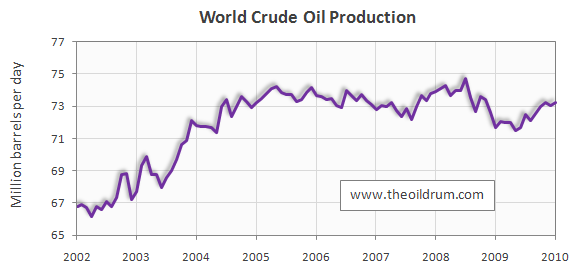
Thursday, April 29, 2010
Has Global Crude Oil Production Peaked?
This chart comes from Oilwatch Monthly, via the Oil Drum. It appears that global oil production peaked about 2004. Since 2004 millions of cars have been sold in India and China. If global oil production does not increase, increased demand will drive gasoline prices ever higher. May observers believe that an increase in oil production is unlikely, and production declines will soon begin.


Subscribe to:
Post Comments (Atom)
Followers
Blog Archive
Contributors
Some neat videos
| Nuclear Advocacy Webring Ring Owner: Nuclear is Our Future Site: Nuclear is Our Future |
||||
 |
 |
 |
 |
 |
| Get Your Free Web Ring by Bravenet.com |
||||
links The Weinberg Foundation
- The Weinberg Foundation
- Deregulate the Atom
- LFTRS to Power the Planet
- Sustainable Energy Today
- ANS Nuclear Cafe
- Thorium Power
- The Nuclear Alternative
- Yes Vermont Yankee
- Nuclear Townhall
- NNadir's underground blog
- oz-energy-analysis.org
- Environmentalists For Nuclear Energy
- Save The Climate (Sauvons Le Climat0
- The Energy Tribune
- masterresources.org
- Nuclear Fissionary
- Nuclear Archer
- This week in batteries (TWIB)
- Gerald E. Marsh & George S. Stanford on Nuclear Policy
- The Capacity Factor
- Canadian Energy Crisis
- Institute for Energy Research
- Energy from Thorium Documents
- Energy from Thorium Discussion Forum
- Next Big Future
- RadiationAnswers.org
- Knowledge Problems
- Brave New Climate
- Thorium electronuclear
- AREVA Blog
- The Energy Collective
- Climate Change Politics
- Reactor Physics Group Publications
- Alexander DeVolpi on nuclear-weapons nonproliferation
- ECOWorld
- New Papyrus Magazine
- Pronuclear Democrats
- American Energy Independence
- coal2nuclear
- Energy Density
- SUSTAINABLE ENERGY - WITHOUT THE HOT AIR
- The Atomic Show
- Atomic Watch
- Pebble Bed Reactors
- The Thorium fuel cycle
- Simon Nisan on Nuclear Desalination
- Dr. Ralph Moir
- National Wind Watch
- Wind Energy Resource Atlas
- solar calculator
- THE NUCLEAR ENERGY OPTION by Bernard L. Cohen
- Oil Drum
- Solar Buzz
- Clean Brake (Tyler Hamilton)
- GM-Volt
- Fuel Cycle Week
- Depleted Cranium: Dr. Buzzo's Bad Science Blog
- Blogging About the Unthinkable
- Uranium Information
- Frank Munger
- The Information Bridge
- Alvin Weinberg Papers
- Left-Atomics (David Walters)
- bartoncii
- Real CLimate
- 1 nuclear place
- World Nuclear News
- David Walters
- NNadir
- NIE Nuclear Notes
- nuclearstreet
- Idaho Samizdat
- Atomic Insights blog
- Energy from Thorium
- A Musing Environment




4 comments:
I don’t think it has peaked yet. There was a new monthly EIA crude and condensate production peak in July 2008 and the decline since then was probably due to OPEC production cuts. Non-OPEC production has risen slightly over the last year and OPEC is now estimated to have about 5 or 6 million barrels per day of spare capacity.
Here’s what Rembrandt Koppelaar says on page 1 of the full PDF subscription version of Oil Watch Monthly:
As the recovery continues for now there is a high chance that the standing record of highest monthly production of 74.73 million b/d, reached in July 2008, will be broken within the next six months. And possibly also the record for the year of highest conventional crude production which was 2005 at a level of 73.72 million b/d.
David M.
I read somewhere that 20 of that 85 bpd currently consumed worldwide are for electricity generation (where there are obvious alternatives), not transportation, particurally in developing countries. Can you Charles (or others) confirm that ?
If it were so, I see peak oil as a non issue
Alex,
20 out of 85 bdp going to electricity, ~24% seems way too high.
According to the IEA, electricity, CHP and heat plants account for 265 millions tonnes of petroleum products out of a total crude production of 3.570 billion tonnes, so about 7.5% of the production.
http://www.iea.org/stats/oildata.asp?COUNTRY_CODE=29
Non-OECD statistics are notoriously unreliable but I wouldn't think the error would be that great.
The stand you took here is worth a praise. Good information. I would like to visit again and spread the word. Keep it up.
Post a Comment